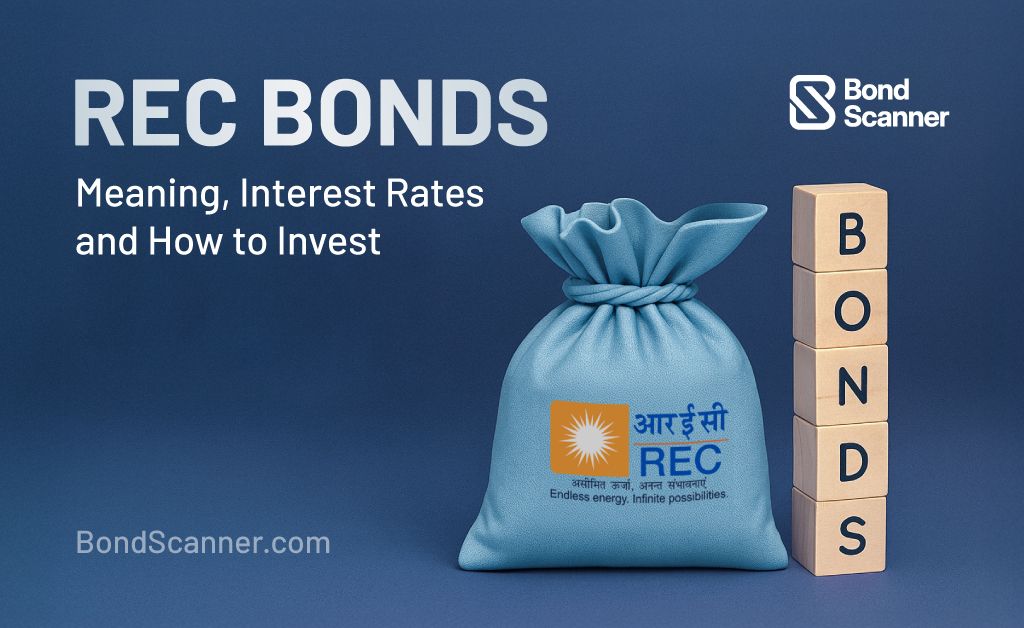REC Bonds: Meaning, Interest Rates & How to Invest
09 October 2025

What Are REC Bonds?
Rural Electrification Corporation (REC) Limited is a Government of India enterprise engaged in financing and promoting power sector projects across India. Among its various financial instruments, REC Bonds have gained prominence for offering stable, government-backed returns while supporting infrastructure growth. These bonds are popular among both retail and institutional investors seeking relatively safer fixed-income options.
This article explores the meaning of REC Bonds, their interest rates, application process, and how investors can buy them online in India.
REC Bonds are debt instruments issued by REC Limited, a Maharatna public sector company under the Ministry of Power. They are primarily used to raise funds for financing power and infrastructure projects such as renewable energy, transmission, and rural electrification.
There are two main types of REC Bonds:
Regular Corporate Bonds – issued for infrastructure and energy projects, traded on exchanges.
Capital Gain Bonds (Section 54EC Bonds) – issued under Section 54EC of the Income Tax Act to help investors save on long-term capital gains tax.
REC Bonds Full Form
The full form of REC Bonds is Rural Electrification Corporation Bonds. These bonds are backed by the Government of India through REC Limited, making them a trusted option for risk-conscious investors.
REC Bonds Interest Rates
The interest rate on REC Bonds depends on the type of bond issued and prevailing market conditions.
54EC Capital Gain Bonds typically offer interest rates around 5.75% per annum, payable annually.
The interest is fully taxable, and the bond tenure is 5 years (previously 3 years before an amendment).
The maximum investment limit is ₹50 lakh per financial year per PAN.
These bonds are considered low-risk because REC is a government-owned entity, and the proceeds are used for nation-building infrastructure projects.
Tax Benefits of REC 54EC Bonds
One of the primary reasons investors prefer REC Bonds is their tax-saving benefit under Section 54EC.
Here’s how it works:
If you sell a long-term capital asset (such as real estate) and invest the gains in REC 54EC Bonds within six months, the capital gains are exempt from tax.
The maximum amount eligible for exemption is ₹50 lakh.
However, premature redemption is not allowed before the completion of 5 years.
This feature makes REC Bonds a popular choice for individuals seeking to save on capital gains tax while maintaining moderate risk exposure.
How to Buy REC Bonds
Investors can apply for REC Bonds both online and offline.
1. Online Method:
You can apply through:
The official REC website – https://recindia.nic.in
Authorized financial intermediaries or online bond platforms registered with SEBI.
Steps:
Visit the platform and choose REC 54EC Bonds.
Complete the KYC process (PAN, Aadhaar, bank details).
Make the payment online via net banking or UPI.
Receive the bond allotment confirmation via email or registered account.
2. Offline Method:
Investors can also apply by submitting physical application forms at designated bank branches or REC offices, along with PAN and address proof. The payment can be made via cheque or demand draft.
REC Bonds Status Check Online
Investors who have applied for REC Bonds can easily check their bond allotment or holding status online.
Visit the REC India website and navigate to the investor section.
Enter your application number or PAN to view bond allotment details.
You can also contact the Registrar and Transfer Agent (RTA) for status updates or issue resolution.
Key Features of REC Bonds
| Feature | Details |
|---|---|
| Issuer | REC Limited (Government of India Enterprise) |
| Bond Type | 54EC Capital Gain Bonds / Corporate Bonds |
| Tenure | 5 years |
| Interest Rate | ~5.75% p.a. (subject to change) |
| Tax Benefit | Exemption under Section 54EC for long-term capital gains |
| Investment Limit | ₹10,000 minimum, ₹50 lakh maximum |
| Listing | Unlisted (for 54EC bonds) |
| Credit Rating | AAA (Highest Safety) |
| Mode of Holding | Physical or Demat form |
Why Investors Consider REC Bonds
Government Backing: Issued by a public sector Maharatna enterprise.
Stable Returns: Offers predictable annual interest income.
Tax Advantage: Capital gains exemption under Section 54EC.
High Credit Safety: AAA rating from leading credit agencies.
Nation-Building Role: Contributes to India’s infrastructure and power development.
However, investors must remember that these bonds are non-transferable and non-tradable, which means liquidity is limited until maturity.
Risks and Considerations
Though REC Bonds are considered safe, investors should be aware of potential risks:
Interest Rate Risk: If market rates rise, fixed interest bonds may underperform.
Liquidity Risk: Since these bonds cannot be traded or redeemed early, investors must hold them till maturity.
Taxable Interest: Interest income is taxable under the “Income from Other Sources” category.
Therefore, REC Bonds are more suitable for long-term investors with moderate risk tolerance and tax-saving goals.
FAQs
1. What is the interest rate on REC Bonds?
The current interest rate on REC 54EC Bonds is approximately 5.75% per annum, payable annually.
2. How can I apply for REC Bonds online?
You can apply through the official REC India website or SEBI-registered platforms by completing the KYC and payment process.
3. What is the lock-in period for REC 54EC Bonds?
The lock-in period is 5 years, during which the bonds cannot be transferred or redeemed.
4. Are REC Bonds safe?
Yes, REC Bonds are issued by a government-owned Maharatna PSU and carry a AAA credit rating, indicating high safety.
5. Do REC Bonds offer any tax benefits?
Yes, investments in REC 54EC Bonds are eligible for capital gains tax exemption under Section 54EC of the Income Tax Act.
Disclaimer
This blog is intended solely for educational and informational purposes. The bonds and securities mentioned herein are illustrative examples and should not be construed as investment advice or personal recommendations. BondScanner, as a SEBI-registered Online Bond Platform Provider (OBPP), does not provide personalized investment advice through this content.
Readers are advised to independently evaluate investment options and seek professional guidance before making financial decisions. Investments in bonds and other securities are subject to market risks, including the possible loss of principal. Please read all offer documents and risk disclosures carefully before investing.
Recent Blogs

GPF Full Form: Understanding General Provident Fund and Its Role in Salary
A detailed guide explaining the GPF full form in salary, its benefits, working mechanism, and how it functions for employees in India.
20 Feb 2026

Difference Between Loan and Debenture: Understanding Key Financial Concepts
Explore the key differences between loans and debentures, their characteristics, benefits, and how each works in corporate finance.
20 Feb 2026

AMO Order Explained: What It Is, Charges, Timing & How to Place an AMO Order in Zerodha
Learn about AMO (After Market Orders), how they work, charges, validity, and how to place AMO orders in Zerodha, along with key differences from pre-market orders.
19 Feb 2026